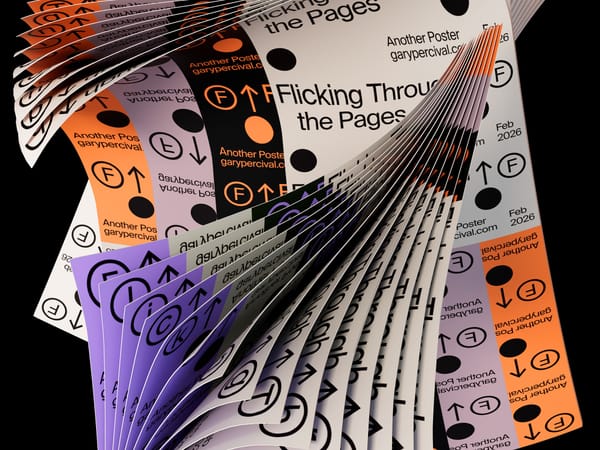Unlocking Mastery: The Art of Asking the Right Questions
At its core, a question is a tool for understanding. When we ask questions, we seek to clarify, to probe deeper, and to gain new knowledge.


As freelancers, graphic designers, and creatives, we are constantly seeking ways to improve our craft, deliver better results for our clients, and grow both personally and professionally.
While there are many strategies and techniques we can employ to reach these goals, one of the most powerful and often overlooked tools at our disposal is the art of asking the right questions. By mastering this skill, we can unlock new insights, challenge our assumptions, and accelerate our learning and growth.
Why Questions Matter
"At its core, a question is a tool for understanding. When we ask questions, we seek to clarify, to probe deeper, and to gain new knowledge."
Questions have the power to open up new possibilities and perspectives that we may not have considered before. They can help us break free from the constraints of our existing knowledge and assumptions and explore new territories.
In the creative field, asking questions is particularly important. Designers often face the challenge of solving complex problems and developing innovative solutions. To do this effectively, we need to be able to look at the problem from multiple angles, consider different viewpoints, and challenge our own preconceptions. Questions allow us to do exactly that.
Moreover, questions are a powerful way to engage our critical thinking skills. When we ask questions, we don't just passively absorb information; we actively process it, analyse it, and evaluate it. This process helps us develop a deeper understanding of the subject matter and enhances our ability to apply our knowledge in practical ways.
Qualities of Effective Questions
However, not all questions are equal. To truly unlock the power of questioning, we need to learn how to ask the right questions. Powerful questions possess several key characteristics:
- Open-ended and thought-provoking: Rather than eliciting a simple yes-or-no answer, powerful questions invite reflection and exploration. They encourage the respondent to think deeply and share their insights and perspectives.
- Penetrating to the heart of the matter: Powerful questions cut through the noise and get to the core of the issue. They help us identify the root cause of a problem or the key factors that are driving a situation.
- Revealing hidden assumptions: We all carry assumptions and biases that shape our thinking and decision-making. We can examine and challenge these assumptions by bringing them to the surface with powerful questions.
- Reframing the issue in a new light: Sometimes, the way we frame a problem can limit our ability to find effective solutions. Powerful questions can help us reframe the issue in a new way, opening up new possibilities and approaches.
Some examples of powerful questions include:
- What are we assuming here that might not be true?
- How might we approach this problem if we had unlimited resources?
- What would success look like in this situation, and how will we know when we've achieved it?
What are the potential unintended consequences of this course of action?
Developing Your Questioning Skills
You can develop and strengthen your ability to ask powerful questions over time, just like any other skill. Here are some strategies for honing your questioning skills:
- Cultivate curiosity: Approach every situation with a sense of wonder and an eagerness to learn. Be open to new ideas and perspectives, and resist the temptation to jump to conclusions or make assumptions.
- Let go of the need to have all the answers: As creatives, we often feel pressure to have all the answers and solutions. However, this mindset can actually limit our ability to learn and grow. Embrace the idea that you don't have to know everything, and be willing to ask for help and input from others.
- Listen deeply: Questioning isn't just about asking; it's also about listening. When you ask a question, give the other person your full attention and listen carefully to their response. Pay attention not just to their words but also to their tone, body language, and overall demeanour.
- Follow up and probe further: Don't be satisfied with surface-level answers. If someone gives a response that seems incomplete or raises new questions, don't be afraid to follow up and probe deeper. Use phrases like "Can you tell me more about that?" or "What do you mean by that?" to encourage further elaboration.
Know when to stay silent: Sometimes, the most powerful question is the one you don't ask. Learn to be comfortable with silence, and give people the space to think and reflect before responding. Often, the most insightful answers come after a moment of contemplation.
Putting It into Practice
Now that we've discussed the power of questioning and some strategies for developing your skills, let's look at how you can put this into practice in your work as a freelancer, graphic designer, creative, or designer.
Self-reflection: Use questions as a tool for self-reflection and personal growth. Ask yourself questions like:
What are my strengths and weaknesses as a designer?
What are the areas where I need to improve my skills or knowledge?
What are my goals and aspirations, and what steps can I take to achieve them?
Enriching conversations and relationships: Use questions to deepen your conversations and relationships with clients, colleagues, and collaborators. Ask questions that show genuine interest and curiosity and that help you understand their needs, goals, and perspectives.
Tackling challenges and making decisions: When faced with a difficult challenge or decision, use questions to explore the issue from multiple angles and generate creative solutions. Ask questions like:
What are the key factors we need to consider in this situation?
What are the potential risks and benefits of each course of action?
How can we approach this problem in a way that aligns with our values and goals?
Inspiring others: As a creative professional, you have the opportunity to inspire and influence others through your work and your interactions. Use questions to challenge and motivate others to think differently, explore new possibilities, and push beyond their limits.
Conclusion
In conclusion, the art of asking the right questions is a powerful tool for unlocking mastery and accelerating growth in any field, but particularly in the creative industries. By cultivating curiosity, listening deeply, and probing further, we can gain new insights, challenge assumptions, and open up new possibilities.
As freelancers, graphic designers, and creatives, we have a unique opportunity to harness the power of questioning in our work and our lives. By making questioning a habit and a core part of our creative process, we can not only improve the quality of our work but also enrich our relationships, inspire others, and unlock our full potential.
The next time you encounter a challenge or an opportunity, pause and ask yourself, "What questions do I need to ask to truly understand this situation and find the best way forward?" You'll be well on your way to unlocking mastery and achieving your goals.



